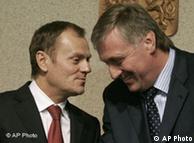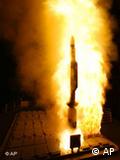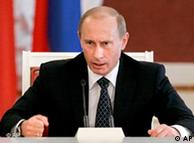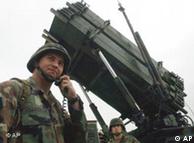Defense | 13.01.2008
Poland Demands US Protection as Missile Shield Debate Heats up
Poland finds itself between a rock and hard place in regards to the planned deployment of US missiles on its territory. As a result, the Poles want assurances that they will be protected, whatever their decision.
Poland cranked up the diplomatic heat on Washington Saturday when Defense Minister Bogdan Klich called for a special military treaty ahead of negotiations on a US missile shield in Europe.
Demanding the same agreements and protection afforded the likes of Italy and Turkey, Klich suggested that the United States owed Poland for the support and concessions it had made over the years.
"Special military agreements link the United States with certain allies like Italy or Turkey," Klich told with the Dziennik daily, in an interview ahead of talks in Washington Tuesday. "The signature of such an accord with Poland seems justified in our view given services rendered to the Americans over recent years.
"The reaction by the United States to our expectations will be a sort of test to see if Washington really considers Poland as its partner in central Europe," Klich told the newspaper. At the moment, he added, the United States treats Poland like "a distant cousin."
Tusk demands US security guarantees
The defense minister's remarks follow those of Prime Minister Donald Tusk who recently linked an agreement with the US on an anti-missile system with enforcing Polish security. Tusk has made it clear he wants extra US security guarantees, possibly in the form of a Patriot missile air defense system similar to one already deployed in neighboring NATO-member Germany.
The US wants to install 10 interceptor missile sites in Poland by 2012 to ward off potential attacks by so-called rogue states, notably Iran. The plan also calls for associated radar stations in the Czech Republic.
 Bildunterschrift: Großansicht des Bildes mit der Bildunterschrift: Polish Prime Minister Tusk, left, with Mirek Topolanek
Bildunterschrift: Großansicht des Bildes mit der Bildunterschrift: Polish Prime Minister Tusk, left, with Mirek Topolanek
Tusk said last week that Poland and the Czech Republic were in no rush to conclude negotiations with Washington. "It is not a race against time. The essential thing is to get what we want from the negotiation, for the Polish as well as the Czech sides," Tusk told a joint news conference with his Czech counterpart, Mirek Topolanek.
The missile plan has raised a number of concerns in Poland. Surveys show a majority of Poles worry the shield could make their country more of a target for terrorists.
Poland fears being left with nothing but fall-out
There are also concerns the shield project could be dropped in the event of a Democratic victory in November's US presidential election. "The worst scenario is a situation in which Poland would agree to the shield, will incur the political costs and then the base is not built, because of a change of government in the United States," Poland's Foreign Minister Radoslaw Sikorski said recently.
Poland's regional agenda also casts a shadow over Tuesday's talks in Washington, with Tusk due in Moscow next month. Poland's ruling liberals are keen to prevent the US plan from compromising their push to mend tattered ties with Russia.
 Bildunterschrift: Großansicht des Bildes mit der Bildunterschrift: Sikorski could not hide the fact that Russia was displeased
Bildunterschrift: Großansicht des Bildes mit der Bildunterschrift: Sikorski could not hide the fact that Russia was displeased
Sikorski held talks with his Russian counterparts recently and revealed that the two countries still faced "fundamental differences" over the US missile shield plan.
After meeting with Russian Deputy Foreign Minister Sergei Kislyak, Sikorski said that the discussions were of a "matter-of-fact" nature. "I came away with the impression that our neighbor is happy that we are finally talking," he added, "but fundamental differences in views remain.
Missile shield signals major shift in defense strategy
The topic of the US missile shield in Europe has generated discussion among defense experts who say that its deployment would be a major shift towards a defensive strategy of deterrence in a new era of nuclear proliferation and rogue regimes.
"The adoption of missile defense in Poland would imply a significant shift in Western strategic thinking," Benjamin Schreer, an analyst at the Berlin-based German Institute for International and Security Affairs told AFP.
 Bildunterschrift: Großansicht des Bildes mit der Bildunterschrift: A mixture of offense and defense
Bildunterschrift: Großansicht des Bildes mit der Bildunterschrift: A mixture of offense and defense
"With new terrorist threats and particularly the proliferation of ballistic missile systems and nuclear weapons, the West's offense-based security and deterrence strategy is no longer sufficient -- a new mix including offensive and defensive elements is necessary," he said.
British expert Tim Williams agreed the shield would be a major departure from current "offensive" policy and said missile defense in Eastern Europe was clearly seen as "the way to go" in an era of shadowy nuclear proliferation.
"It moves from the current practice of deterrence with offensive weapons to deterrence by defense and denial -- denying your enemy the ability to strike," Williams, from the Royal United Services Institute, told AFP. "It could be the first step in a new global security architecture," he added.
Expert believes shield could reduce nuclear threat
Schreer went even further, suggesting that a shift to missile defense systems from purely offensive capabilities could "reduce the West's reliance on nuclear weapons as a primary means of deterrence."
 Bildunterschrift: Großansicht des Bildes mit der Bildunterschrift: Putin's Russia can protest but not stop the missile shield
Bildunterschrift: Großansicht des Bildes mit der Bildunterschrift: Putin's Russia can protest but not stop the missile shield
Critics say the project could provoke a new arms race and point to Russian President Vladimir Putin's recent decision to suspend participation in the CFE, a Cold War-era treaty that set limits on troops and weapons.
Other missile shield opponents contend the project just won't fly as it relies on unworkable technology and is simply too expensive given there is no credible threat to justify it.
Russia's opposition can not stop shield
While Washington continues its negotiations with Prague and Warsaw, it is also attempting to win over Moscow -- so far with little success.
Schreer forecasts that Moscow's objections would not prove decisive to the project's future. "It knows perfectly well it can't stop the missile shield just as it could not prevent the (1999) expansion of NATO to its doorstep," he said. "Russia also shares a fundamental security concern with the West -- both are worried about Iran developing an offensive nuclear capability."

Comments